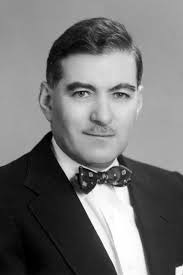Loading AI tools
American anthropologist From Wikipedia, the free encyclopedia
Sol Tax (30 October 1907 – 4 January 1995) was an American anthropologist. He is best known for creating action anthropology and his studies of the Meskwaki, or Fox, Indians, for "action-anthropological" research titled the Fox Project, and for founding the academic journal Current Anthropology. He received his doctorate from the University of Chicago in 1935 and, together with Fred Eggan, was a student of Alfred Radcliffe-Brown.
Sol Tax | |
|---|---|
 | |
| Born | 30 October 1907 Milwaukee, Wisconsin, U.S. |
| Died | 4 January 1995 (aged 87) |
| Nationality | American |
| Alma mater | University of Wisconsin (Ph.B, 1931)[1] University of Chicago (Ph.D, 1935)[1] |
| Known for | Fox Indians |
| Awards | Viking Fund Medal (1961) Bronislaw Malinowski Award (1977) |
| Scientific career | |
| Fields | anthropology |
Tax grew up in Milwaukee, Wisconsin. During his formative years he was involved in a number of social clubs. Among these was the Newsboys Republic with which his first encounter was when he was "arrested" for breaking their rules. Tax began his undergraduate education at the University of Chicago but had to leave for lack of funds. He returned to school at the University of Wisconsin–Madison, where he studied with Ralph Linton. He later earned a doctorate at the University of Chicago in 1935.[2] He joined the faculty of that institution in 1940 where he spent several decades teaching.[2] Tax was a mentor to noted anthropologist Joan Ablon at the University of Chicago.
He was the main organizer for the 1959 Darwin Centennial Celebration held at the University of Chicago. He was an organizer, along with the National Congress of American Indians, including Native American organizer Willard LaMere,[3] of the 1961 American Indian Chicago Conference. He assisted in authoring the resulting Statement of Indian Purpose, the first major statement of the policy of tribal self-determination.
The American Anthropological Association presented to him and Bela Maday its Franz Boas award for exemplary service to anthropology in 1977. He was the association's president in 1959.[4][5]

Sol Tax is known as a founder of "Action Anthropology", a school of anthropological thought that forwent the traditional doctrine of non-interference in favor of co-equal goals of "learning and helping" from studied cultures.[6] As an example, he was a lead organizer of the influential 1961 American Indian Chicago Conference (AICC).[3] The meeting brought together 460 American Indians from 90 tribes from June 13 to June 20, 1961, at the University of Chicago to help "all Indians of the whole nation to express their own views" and draft a shared "Declaration of Indian Purpose."[7] President John F. Kennedy received the declaration in a ceremony at the White House in 1962. The spirit of self-determination expressed in the document became a cornerstone of Native activism in the years that followed, including the Red Power movement and the expansion of Native American gaming.[8]
In 1974, when the Chicago Native American Committee established the Native American Educational Services College (NAES College), Tax served on its original academic review committee. As the college grew, the academic review committee was converted into a board of directors in 1978. Tax accepted an invitation to join, and he served on the committee until 1993, not long before his death. NAES credited Tax with playing a "key role in helping define a vision of Indian higher education as the basis for community development in culturally relevant terms." Tax's particular contribution was the core idea of field projects in the NAES curriculum.[9]
Seamless Wikipedia browsing. On steroids.
Every time you click a link to Wikipedia, Wiktionary or Wikiquote in your browser's search results, it will show the modern Wikiwand interface.
Wikiwand extension is a five stars, simple, with minimum permission required to keep your browsing private, safe and transparent.